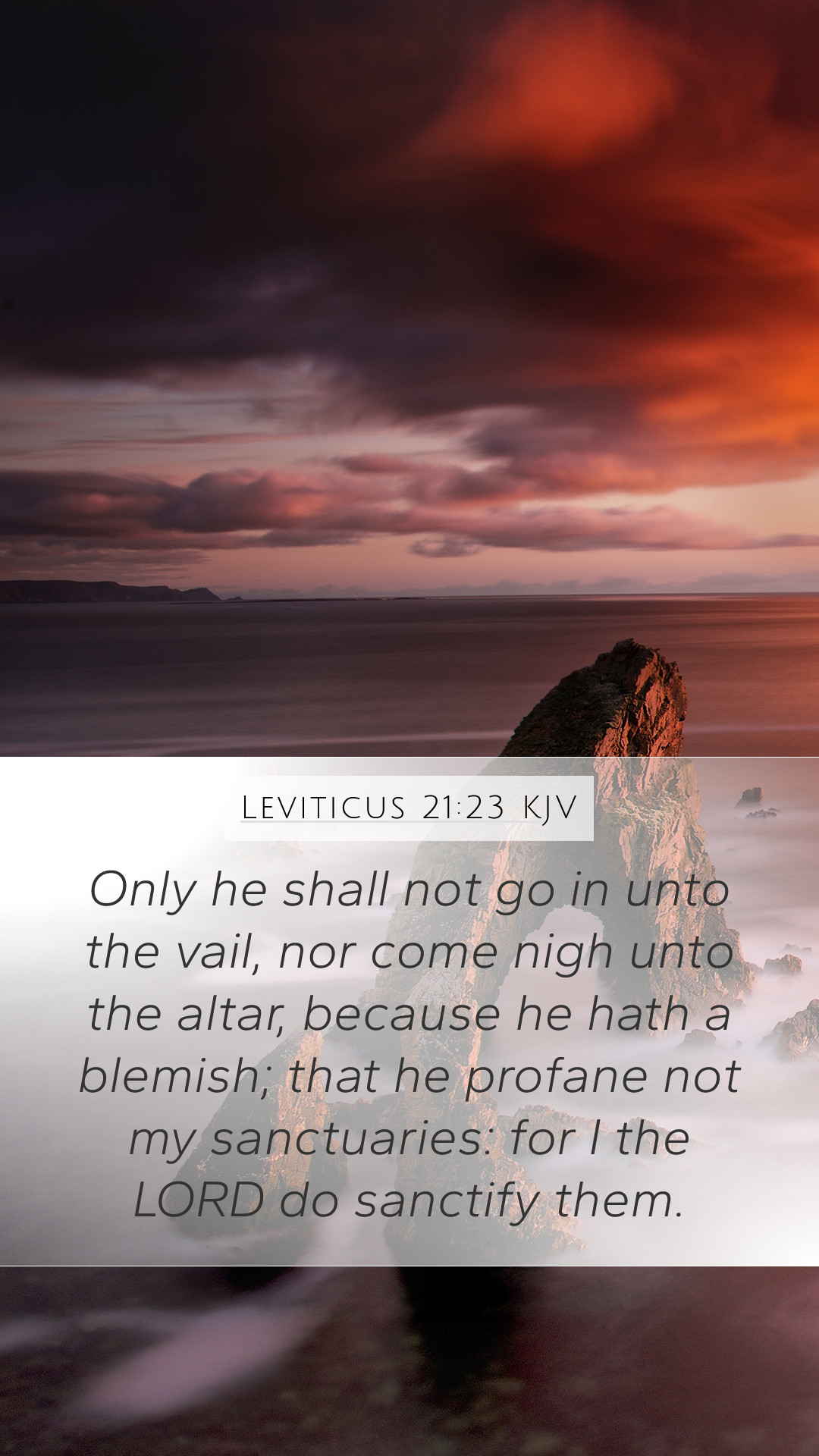Bible Verse Meaning and Interpretation of Leviticus 21:23
Leviticus 21:23 states, "But he shall go in unto his own people, and shall not profane my sanctuaries; for I the Lord do sanctify them." This verse primarily discusses the conduct expected of priests concerning their sacred duties and interactions.
This verse serves as a guideline emphasizing the importance of maintaining holiness in relation to God and His sanctuary. The priests, set apart for service, were to respect their unique role, ensuring that their actions did not defile the sacred space.
Summary of Insights from Public Domain Commentaries
Matthew Henry's Commentary
Matthew Henry emphasizes the sanctity of the priesthood in his analysis of Leviticus 21:23. He highlights that the role of a priest is not just a position but a calling, which comes with specific responsibilities toward God’s holy places. He notes the necessity for priests to maintain personal integrity and holiness as they serve, reinforcing the idea that they must separate themselves from actions or behaviors that could lead to profaning the holiness of God's sanctuary. Henry explains that the sanctuaries are consecrated and that the priests must ensure their actions reflect that sacredness.
Albert Barnes' Notes
Albert Barnes provides a context to the law regarding the priests and their conduct when they are to engage with the community or approach God. He explains that the instruction in Leviticus 21:23 ensures that priests do not forget their unique status and obligations, as their conduct can either uphold or diminish the revered perception of the sacred spaces they represent. Barnes emphasizes the theme of separation from impurities and the call to holiness that marks the priest's life, which ultimately serves to foster a proper respect and honor towards divine worship.
Adam Clarke's Commentary
Adam Clarke draws attention to the cultural context of Leviticus and how the roles of priests were distinctive and honored within the community. He explains that for a priest to go unto his own people signifies his return to the common life among the Israelites, with an implicit understanding that his priestly duties must always prioritize the holiness of God’s dwelling place. Clarke, too, reinforces the imperative for priests to exemplify holiness in their actions and interactions, upholding the standard set by God for all who serve in sacred roles.
Key Themes and Applications
- Holiness and Consecration: The main theme revolves around the holiness required of those who serve in God’s sanctuary, reminding the faithful that even in communal engagement, personal conduct should reflect God’s holiness.
- Responsibility: The verse highlights the responsibility borne by leaders in the faith community, urging them to act with mindfulness and respect for divine mandates.
- Separation from Defilement: It calls attention to the necessity of avoiding actions that may defile the sanctity of worship and community engagement.
- Application to Daily Life: Understanding Leviticus 21:23 encourages believers today to consider how their actions in everyday life affect their spiritual integrity and community worship.
Cross References
- Exodus 28:43 - Discusses the importance of the priests' garments reflecting their holiness.
- Leviticus 10:3 - Emphasizes the need for priests to honor God’s command to maintain holiness.
- 1 Peter 2:9 - Talks about the priesthood of all believers, calling them to live as a holy nation.
Conclusion
Understanding Leviticus 21:23 requires a deep engagement with the themes of holiness, responsibility, and community in biblical narratives. It acts as a blueprint for anyone exploring the sacredness of worship in their lives, contributing to a broader effort in Bible study insights and Scripture analysis.
As we reflect upon this verse, let us seek to uphold these principles in our approach to worship and community, recognizing the significance of maintaining our spiritual integrity in all aspects of life.


